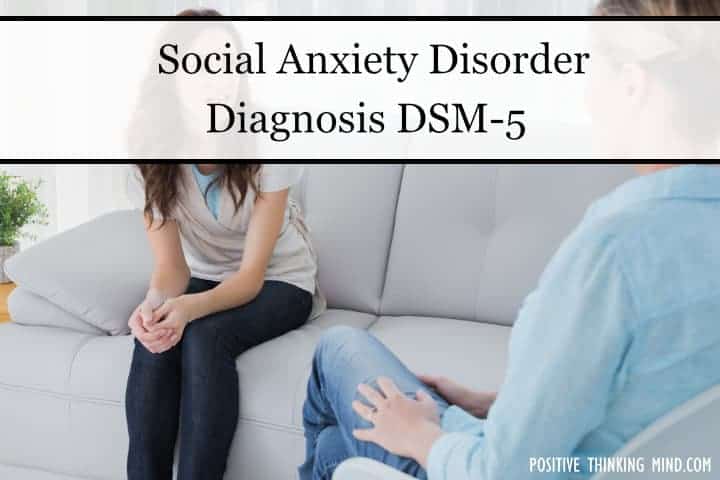Social Anxiety Disorder Diagnosis DSM5
Suppose you think you may have a social anxiety disorder, or your doctor has recently evaluated you and has given you a social anxiety disorder diagnosis. In that case, you are in the right place.
Here you will learn how a mental health professional makes their decision according to the DSM-5 (Diagnostic and Statistical Manual of Mental Disorders).

What Is Social Anxiety?
Social anxiety disorder, also known as social phobia, involves distress around people and social interactions.
The DSM-5 manual associates social anxiety disorder with other anxiety disorders like generalized anxiety disorder, panic disorder, and specific phobias.
Someone with social anxiety will be concerned with being embarrassed or judged by others, and the discomfort felt as fear and anxiety will often occur with the following symptoms.
- Nausea
- Tremors
- Apnea
- Increased heart rate
- Sweating
A person with social anxiety disorder wants to participate in social situations, humans are social beings, but their anxiety can be intolerable.
Eventually, this can lead to isolation, and their social skills may diminish or become under-developed, further deepening their social anxiety.
Social Anxiety Disorder Statistics Among Adults
The statistics are based on data from the National Comorbidity Survey (NCS-R) between 2001-2003.
It is estimated that 7.1 percent of adults have had social anxiety in the past year. Females were more than likely to have a social anxiety disorder at 8 percent, while males were 6.1 percent.
Younger age groups tend to have social anxiety more than older people.
- 18-29 | 9.1%
- 30-44 | 8.7%
- 45-59 | 6.8%
- 60+ | 3.1%
Of the adults who had a social anxiety disorder, 29.9 percent had a severe impairment in their lives. 38.8 percent had a moderate impairment, and 31.3 percent had mild impairment.
Symptoms Of Social Anxiety Disorder
First, I will start with the criteria laid out in the DSM-5 in Section 300.23 on pages 202-203 in a more simplified version (not doctor-speak).
A. When you have fear or anxiety in social situations where you might meet new people, feel they may scrutinize you, feel observed, and in the spotlight.
You may also feel anxious in a job interview, giving an oral presentation or speaking in a meeting as well as eating in front of people.
B. You fear you will display your anxiety symptoms, and others will judge you negatively, and you will become embarrassed or be rejected.
C. Social interaction always brings distress and feelings of fear or anxiety. Children may cry, become clingy, not speak, or have tantrums.
D. You either avoid social interactions or reluctantly endure them with intense stress and anxiety.
E. Your fear will be exaggerated or disproportionate to what the actual situation is.
F. You fear, distress, anxiety around social situations has lasted six months or longer.
G. The fear or anxiety causes significant distress or impairment in your daily life, either occupational functioning or interpersonal.
H. Your anxiety is not due to a medical condition, medication, or substance abuse.
I. Your anxiety is not from another mental disorder.
J. Another medical condition is present, which may cause you to be over self-conscious.
Associated Features Supporting the Diagnosis
- excessively submissive or lack assertiveness
- rigid body posture
- minimal eye contact
- overly soft voice
- shy or withdrawn
- finding jobs with little social contact
- live with their parents longer
- take longer to have a family or get married
- choosing to be a homemaker over finding a job
- self-medicating or substance abuse
Differential Diagnosis
The differential diagnosis has to do with finding the differences between one disorder versus another disorder.
Your therapist or clinician must take in all the facts or symptoms to rule out other disorders.
Many people are shy or introverted naturally and could misinterpret them as having social phobia or social anxiety.
Vice versa, someone with social anxiety could mistakenly be diagnosed with another disorder.
Here are some mental disorders a therapist would need to take into account:
- depression
- post-traumatic stress disorder (PTSD)
- panic disorder
- shyness
- generalized anxiety disorder (GAD)
- introversion
- agoraphobia
What Is The Treatment For Social Anxiety?
While you may have social anxiety and may always live with it, there are a few beneficial treatments that may help, including cognitive-behavioral therapy or CBT for short, and taking medication.
How Do You Get Diagnosed?
How do you get diagnosed with a social anxiety disorder? If you have symptoms or are concerned, making an appointment with your doctor is the first step.
Your doctor or mental health professional will do diagnostic testing, and it typically lasts about an hour to an hour and a half.
They will ask you questions to help rule out other disorders and make sure you meet the criteria for having social anxiety.
